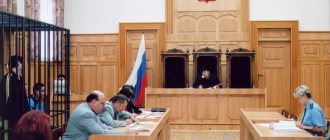ST 305 of the Criminal Code of the Russian Federation.
1. The issuance by a judge (judges) of a knowingly unjust sentence, decision or other judicial act is punishable by a fine in the amount of up to three hundred thousand rubles or in the amount of the wages or other income of the convicted person for a period of up to two years, or by forced labor for a term of up to four years, or imprisonment for a term of up to four years.
2. The same act, associated with the issuance of an illegal court sentence to imprisonment or entailing other grave consequences, is punishable by imprisonment for a term of three to ten years.
Commentary to Art. 305 of the Criminal Code
1. The subject of the crime is a sentence, decision or other judicial act (see, in particular, Article 5 of the Code of Criminal Procedure of the Russian Federation, Part 1 of Article 194 of the Code of Civil Procedure of the Russian Federation, Part 2 of Article 15 of the Code of Arbitration Procedure of the Russian Federation). Judicial acts are adopted at any stage of constitutional, civil, administrative, arbitration or criminal proceedings either by a single judge or by a collegial composition of the court. The subject of a crime is only judicial acts that have significance beyond the relevant legal proceedings and significantly affect the legal status of certain persons. Such other judicial acts include a court order, a ruling of the appellate court, an appeal decision to change the decision of the magistrate or cancel it, a ruling of the cassation court, a jury verdict, etc. Judicial acts adopted by the court, but not in connection with legal proceedings in a specific case, do not relate to the subject of the crime.
2. The objective side is expressed in the form of actions to make, i.e. acceptance and proper drafting (registration) of a knowingly unjust sentence, decision or other judicial act. Proclamation (announcement) follows the pronouncement (decree) of a sentence, decision or other judicial act (if it is drawn up in writing) or accompanies it (if the act is adopted directly in the courtroom). The deliberate unfairness of these judicial acts consists in their adoption in violation of the requirements of procedural legislation and based on the incorrect application of the relevant substantive legislation. Unfairness presupposes the existence of grounds on which they can be overturned (conviction against a obviously innocent person, imposition of an unreasonably severe punishment, etc.). These actions related to the imposition of an illegal court sentence to imprisonment or resulting in other grave consequences (Part 2) form a qualified crime. This can be regarded as the very fact of issuing a deliberately unjust sentence of imprisonment, as well as the issuance of a deliberately unjust verdict by the jurors, on the basis of which the sentence was decided.
3. The crime is recognized as completed from the moment of proper execution (and in some cases, simultaneous announcement) of the judicial act. Part 2 requires the onset of grave consequences. The concept of grave consequences is evaluative; they may consist of material damage, breakup of the convicted person’s family, etc.
4. The subjective side is characterized by direct intent, implying the awareness that a sentence, decision or other judicial act is unjust.
5. Special subject: judge, juror, arbitration assessor.
Article 305. Issuance of a knowingly unjust sentence, decision or other judicial act
Determination of the Constitutional Court of the Russian Federation dated January 26, 2017 N 101-O FEDERATION AND ARTICLE 305 OF THE CRIMINAL CODE OF THE RUSSIAN FEDERATION The Constitutional Court of the Russian Federation composed of Chairman V.D. Zorkin, judges K.V. Aranovsky, N.S. Bondar, G.A. Gadzhieva, Yu.M. Danilova, L.M. Zharkova, S.M. Kazantseva, S.D. Knyazeva, A.N. Kokotova, L.O. Krasavchikova, S.P. Mavrina, N.V. Melnikova, Yu.D. Rudkina, O.S. Khokhryakova, V.G. Yaroslavtseva,
Determination of the Constitutional Court of the Russian Federation dated September 28, 2017 N 2000-O
As follows from the complaint, which does not provide any arguments to substantiate the assertion of the unconstitutionality of Articles 151 and 1064 of the Civil Code of the Russian Federation, Article 268 of the Civil Procedure Code of the Russian Federation, Articles 159 and 305 of the Criminal Procedure Code of the Russian Federation, Articles 1, 125, 140 and 144 of the Criminal Procedure Code of the Russian Federation Federation, Articles 5 and 10 of the Federal Law “On the Procedure for Considering Appeals of Citizens of the Russian Federation”, the applicant connects the violation of his constitutional rights not with the instructions contained therein, which do not imply their arbitrary application, but points to the non-compliance with these legal provisions by law enforcement agencies in cases with his participation, expresses disagreement with court decisions and, in essence, demands to evaluate their legality and validity, which does not apply to the powers of the Constitutional Court of the Russian Federation, defined by Article 125 of the Constitution of the Russian Federation and Article 3 of the Federal Constitutional Law “On the Constitutional Court of the Russian Federation”.
Resolution of the Presidium of the Supreme Court of the Russian Federation dated December 4, 2019 N 113-P19
By a decision of the judge of the Zheleznodorozhny District Court of Ryazan dated December 10, 2008, the complaint of lawyer D.A. Ershov was rejected. in accordance with Art. 125 of the Code of Criminal Procedure of the Russian Federation in the interests of Konyaev S.N. on recognizing as illegal and unfounded the decision of the senior investigator of the Zheleznodorozhny Interdistrict Investigation Department of the city of Ryazan of the Investigative Directorate of the Investigative Committee at the Prosecutor's Office of the Russian Federation for the Ryazan Region dated May 26, 2008 on the refusal to initiate a criminal case based on the application of Sergei Nikolaevich Konyaev about the crime committed against him during the period from May 13, 2006 to June 2006 crimes under Art. Art. 285, 286, 292, 301, 303, 305 of the Criminal Code of the Russian Federation.
Appeal ruling of the Judicial Collegium for Criminal Cases of the Supreme Court of the Russian Federation dated June 20, 2018 N 16-APU18-4
- according to Part 1 of Art. 305 of the Criminal Code of the Russian Federation to a fine of 200,000 rubles. Based on Art. The Criminal Code of the Russian Federation, due to the expiration of the statute of limitations for criminal prosecution, was exempted from the imposed punishment under Part 1 of Art. 292 of the Criminal Code of the Russian Federation.
Appeal ruling of the Judicial Collegium for Military Personnel Cases of the Supreme Court of the Russian Federation dated 07/09/2020 N 223-APU20-2
The convicted Petukhov, in several of his additions to the appeal, claims a violation of the requirements of paragraph 1 of Part 1 of Art. 24, art. Art. 259, 260 of the Code of Criminal Procedure of the Russian Federation and his rights to familiarize himself with the protocol of the court session, audio recordings of the court session and submit comments on this record before the verdict in the case is rendered. He believes that the judge was obliged to terminate the criminal case against him due to the absence of a crime under Part 2 of Art. 228 of the Criminal Code of the Russian Federation, and the verdict in the case could not be pronounced without a prepared protocol of the court session. Expresses disagreement with the court's conclusions based on the totality of evidence examined in the case, and therefore claims falsification and distortion of the testimony of witnesses M., B., R. and others in the verdict, and the ignoring and incorrect assessment of a number of written evidence in the case. The judge specifically gave him a copy of the verdict on 180 pages, although the verdict itself is set out on 223 pages, did not satisfy his request for a private ruling against employees of the Federal Security Service of Russia in the Samara region and investigator M. on the fact that they committed several crimes during the investigation of a criminal case against him crimes. Draws attention to the incorrect behavior of the state prosecutor Mikhailovsky during the consideration of the case in the court of first instance, in connection with which the defense challenged the state prosecutor, but the court did not satisfy it. He asks, on the basis of his statements, his father’s appeals to various authorities and publications in the media, to bring Judge T. to criminal liability under Part 3 of Art. 303 and art. 305 of the Criminal Code of the Russian Federation, since the judge was biased when considering a criminal case, followed the instructions of employees of the FSB of Russia in the Samara region, who had incriminating materials against him and carried out prompt support of the case, and the lack of response to these appeals from him and his father from higher courts the convicted Petukhov regards it as evidence of the injustice of the conviction against him.
Determination of the Constitutional Court of the Russian Federation dated July 23, 2020 N 1916-O
CONSTITUTIONAL RIGHTS ARTICLE 305 OF THE CRIMINAL CODE OF THE RUSSIAN FEDERATION AND PART EIGHT OF ARTICLE 448 OF THE CRIMINAL PROCEDURE CODE OF THE RUSSIAN FEDERATION The Constitutional Court of the Russian Federation composed of Chairman V.D. Zorkin, judges K.V. Aranovsky, A.I. Boytsova, N.S. Bondar, G.A. Gadzhieva, Yu.M. Danilova, L.M. Zharkova, S.M. Kazantseva, S.D. Knyazeva, A.N. Kokotova, L.O. Krasavchikova, S.P. Mavrina, N.V. Melnikova, Yu.D. Rudkina, V.G. Yaroslavtseva,
Appeal ruling of the Judicial Collegium for Criminal Cases of the Supreme Court of the Russian Federation dated November 21, 2018 N 41-APU18-14
- according to Part 1 of Art. 305 of the Criminal Code of the Russian Federation (as amended by Federal Law No. 420-FZ of December 7, 2011) (episode "...") to 1 year of imprisonment; with release on the basis of paragraph “b” of Part 1 of Art. Criminal Code of the Russian Federation, clause 3, part 1, art. 24 of the Code of Criminal Procedure of the Russian Federation from the imposed punishment due to the expiration of the statute of limitations for criminal prosecution;
“Legal positions of the Constitutional Court of the Russian Federation on certain issues. Individualization of legal responsibility"
The contested provision of paragraph 2 of Article 1070 of the Civil Code of the Russian Federation not only excludes the presumption of guilt of the harm-doer, but also presupposes, as an additional mandatory condition for compensation by the state, the establishment of the guilt of the judge by a court verdict and, therefore, connects the responsibility of the state with the criminal act of the judge committed intentionally (Article 305 of the Criminal Code of the Russian Federation “Issuing a knowingly unjust sentence, decision or other judicial act”) or through negligence (failure or improper performance by a judge as a court official of his duties due to dishonest or negligent attitude towards service, if it entailed a significant violation of the rights and legitimate interests of citizens, - Article 293 of the Criminal Code of the Russian Federation “Negligence”).
Appeal ruling of the Judicial Collegium for Administrative Cases of the Supreme Court of the Russian Federation dated October 3, 2018 N 21-APG18-3
by the decision of the qualification board of judges of the Kabardino-Balkarian Republic dated October 27, 2022, the request of the Chairman of the Investigative Committee of the Russian Federation to give consent to initiate a criminal case against the former judge of the Nalchik City Court of the Kabardino-Balkarian Republic F.Z. Nakhusheva was refused. on the grounds of crimes provided for in Part 2 of Article 305, Part 2 of Article 305 of the Criminal Code of the Russian Federation.
Appeal ruling of the Appeal Board of the Supreme Court of the Russian Federation dated April 27, 2021 N APL21-138
Links in the appeal Dadash I.A. on the fact that during her work, she issued a resolution in a case of an administrative offense against an individual for violating migration legislation without imposing punishment in the form of deportation from the territory of the Russian Federation, after which inspections were carried out against her repeatedly, and there was also an attempt bringing her to criminal liability under Article 305 of the Criminal Code of the Russian Federation does not indicate the existence of a relationship between the circumstances that served as the basis for making the Representation and the position Dadash I.A. occupied in connection with the administration of justice, since the events that served as the basis for the inspection according to Z.’s statement, they have a different subject and are not related to those cited by Dadash I.A. events neither in time nor in the circle of persons participating in them.
Decision of the Disciplinary Board of the Supreme Court of the Russian Federation dated June 25, 2020 N DK20-29
Dadash I.A. also explained that the administrative materials were to be considered by the duty judge T on February 5, 2022. She accepted the material regarding K. for her proceedings only because the duty judge was busy in another trial. Asks to take into account L.’s explanation that in a conversation with Dadash I.A. the latter did not give him any promises regarding non-expulsion. He believes that by issuing a decision to bring K. to administrative responsibility, no harm was caused to any legal relations, since the non-use of administrative expulsion when imposing punishment under Part 1.1 of Art. 18.8 of the Code of Administrative Offenses of the Russian Federation is consistent with the practice of both the Belorechensky district and Krasnodar regional courts. He believes that the decision against K. cannot be assessed as unjust, since a decision was made against her to refuse to initiate a criminal case due to the absence of corpus delicti in the actions provided for in Part 1 of Art. 305 of the Criminal Code of the Russian Federation.
Second commentary to Art. 305 of the Criminal Code of the Russian Federation
1. The unfairness of the acts specified in the law is determined in accordance with the norms of procedural legislation and is characterized by significant violations of the procedural law, incorrect application of the substantive law, and inconsistency of the court’s conclusions with the actual circumstances of the case. The unfairness of a sentence, decision, ruling and ruling always indicates that a judicial act does not reflect the objective truth of the case.
2. The crime is considered completed from the moment a sentence, decision or other judicial act is pronounced and it is signed by the judge (judge).
3. The subjective side presupposes direct intent. Knowingness as a sign characterizing the subjective side of the crime allows us to delimit the act provided for in Art. 305, from other abuses of office by judges, as well as from disciplinary offenses.
4. The subject of the crime is a judge at any level of the country’s judicial system (except for the Constitutional Court of the Russian Federation, constitutional and statutory courts of the constituent entities of the Russian Federation), chairmen of courts, their deputies, as well as jurors and arbitration assessors who participated in the preparation and signing of the judicial act.
5. In part 2 of Art. 305 of the Criminal Code provides for two qualifying criteria:
1) issuing a knowingly illegal sentence of imprisonment;
2) the onset of grave consequences.


